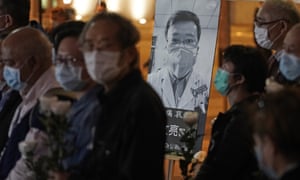‘This may be the last piece I write’: will a Xi critic’s words ring true?
Professor unreachable and his social media accounts cut off as fury rises over state censorship

The Chinese professor Xu Zhangrun, who published a rare public critique of President Xi Jinping over China’s coronavirus crisis, has now been barred from social media, and his friends have not been able to contact him for several days, they told the Observer.
His passionate attack on the government’s system of controls and censorship, Viral Alarm: When Fury Overcomes Fear, was published this month as a powerful debate on freedom of speech convulsed the country.
The death on 7 February of whistleblowing doctor Li Wenliang, who had tried to warn colleagues about the virus but was reprimanded and silenced by security forces, had triggered an outpouring of grief and anger and an unusual public discussion about censorship.
“Li’s death has thoroughly exposed the ills of the party’s governance and control; this has a huge impact on people’s minds,” said Hong Zhenkuai, an independent historian who is currently working outside China, as a visiting scholar at Tokyo University.
The mechanisms that normally constrain Chinese journalists have also eased slightly, with some of the most powerful stories about life in quarantined Wuhan and the latest news about the evolution of the outbreak coming from mainland newsrooms like that of magazine Caixin.
But public anger over censorship, and the particular circumstances of a national emergency, should not be mistaken for any fundamental change within the Chinese Communist party, which has been honing its ability to control the national conversation for decades, activists and intellectuals say.
When Professor Xu published his essay, he warned that he was likely to be punished; he said he had already been suspended from work, lost his position as a professor, and had “freedoms curtailed” over critiques published nearly a year earlier.
“I can now all too easily predict that I will be subjected to new punishments; indeed, this may well even be the last piece I write,” he wrote at the end of his latest essay.
Friends say that, since publication, Xu’s account has been suspended on WeChat, a Chinese messaging app, and they have been unable to get in touch with him for days. Most believe he has not been detained, and is at home in Beijing, but his name has been scrubbed from Weibo, and only a few articles from several years ago showing up on the country’s biggest search engine, Baidu. Calls to his mobile phone went unanswered on Friday.
In a further reminder of the government’s strict controls, two citizen journalists who were reporting from the epicentre of China’s coronavirus outbreak have vanished this week, apparently detained.
The Chinese military surgeon who exposed the government’s cover-up of the Sars outbreak in 2002-2003 has been under de facto house arrest since last year, the Guardian revealed this month. Detention came after he wrote to the top leadership asking for a reassessment of the 1989 Tiananmen Square pro-democracy movement.
“There is no space for speech freedom in China now,” said Hong. “The impacts on the individuals are multi-faceted. Economically, they would cut off your livelihood [academics get fired, writers can’t publish and no one dares hire you]. You would get sidelined by mainstream society, you’d lose friends and, worse than that, you might lose your personal freedoms, so a number of intellectual elites have chosen to leave China.”
Since he took power in late 2012, Xi has tightened ideological control and suppressed civil freedoms across the nation, reversing a trend under his predecessor to give Chinese media some limited scope to expose and report regional corruption and lower-level officials’ misdeeds.
Even within the Communist party, cadres are threatened with disciplinary action for expressing opinions that differ from the leadership.
Under Xi’s crackdown on speech and academic freedoms, a number of prominent liberal intellectuals, journalists, rights lawyers and NGO workers have either been silenced, jailed or escaped abroad.
No comments:
Post a Comment